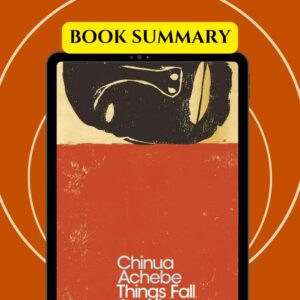Things Fall Apart Summary: Unpacking Chinua Achebe’s Masterpiece
Chinua Achebe, a prolific Nigerian author and scholar, penned Things Fall Apart in 1958, reshaping the landscape of African literature.
Set in pre-colonial Nigeria, Things Fall Apart provides a poignant portrayal of Igbo society on the brink of transformation.
The novel challenges colonial narratives, shedding light on the cultural richness and complexities of indigenous African communities.
Before delving into a deep analysis of the book, grasping the central narrative is crucial to appreciate the underlying themes and messages conveyed by Achebe.

Table of Contents
Setting and Context
Overview of the Setting
The narrative unfolds in the lush landscapes of pre-colonial Nigeria, offering a glimpse into the societal dynamics and traditions prevalent in the region.
Description of Igbo Society and Cultural Traditions
Achebe intricately captures the essence of Igbo customs, rituals, and beliefs, showcasing a vibrant and intricate cultural tapestry.
Introduction of Protagonist and Key Characters
Meet Okonkwo, the formidable protagonist driven by a relentless pursuit of power and status in his community.
Key characters like Nwoye, Ezinma, and Mr. Brown play pivotal roles in shaping Okonkwo’s journey and the overall narrative.
Plot Summary
Okonkwo’s Rise to Power and Downfall
The storyline follows Okonkwo’s ascendancy in the clan, marked by his unwavering determination and adherence to traditional values.
Conflict Between Tradition and Change
A central theme in the narrative, the clash between tradition and modernity challenges Okonkwo’s beliefs and sets the stage for profound societal shifts.
Impact of European Colonizers
The arrival of European colonizers disrupts the delicate balance of Igbo society, sparking tensions and irrevocably altering the community’s dynamics.
Themes Explored
Masculinity, Power, and Cultural Identity
Achebe delves into themes of masculinity, power dynamics, and the intricate dance between individual identity and cultural heritage.
Colonization’s Effects on Indigenous Cultures
The novel serves as a poignant commentary on the devastating consequences of colonization, highlighting the erosion of indigenous traditions and values.
Clash Between Tradition and Modernity
Through nuanced storytelling, Achebe unpacks the complexities of navigating the clash between entrenched traditions and the winds of change sweeping through the community.
By meticulously dissecting the intricacies of Achebe’s Things Fall Apart, readers can immerse themselves in a rich tapestry of culture, tradition, and societal upheavals, unravelling the timeless themes that continue to resonate in contemporary discourse.
Analysis of Things Fall Apart
Character Analysis
- Okonkwo:
- Complex character: Okonkwo is portrayed as a strong, ambitious man who is deeply driven by his fear of failure and a desire for power and respect in his community.
- Tragic hero: Despite his strength and success, Okonkwo’s fatal flaw of excessive pride ultimately leads to his downfall and alienation from his family and culture.
- Contradictions: While Okonkwo embodies traditional masculinity and adherence to Igbo values, his harsh demeanor and violent tendencies also reveal the internal conflicts within him.
- Nwoye:
- Symbol of change: Nwoye symbolizes the younger generation’s struggle with the clash between traditional beliefs and the influence of Christian missionaries, leading to his estrangement from his father and the Igbo way of life.
- Transformation: Through Nwoye’s journey of self-discovery and conversion to Christianity, Achebe illustrates the complexities of cultural identity and the impact of colonization on individual beliefs.
- Ezinma:
- Resilient spirit: Ezinma, Okonkwo’s daughter, stands out as a strong and insightful character who defies societal norms regarding gender roles and displays a deep connection with her father.
- Foreshadowing: Her close relationship with Okonkwo and her wise nature serve as a poignant symbol of hope and continuity amidst the turmoil within the Igbo community.
- Mr. Brown:
- Cultural mediator: As the compassionate and understanding missionary, Mr. Brown represents a contrast to the later European colonizers, embodying a more sympathetic approach to indigenous cultures and fostering a sense of understanding and cooperation.
- Legacy: Mr. Brown’s legacy echoes beyond his time in the novel, highlighting the potential for peaceful coexistence and mutual respect between different cultural and religious beliefs.
Symbolism and Imagery
- Locusts:
- Symbol of change: The arrival of the locusts in the village serves as a metaphor for the impending disruption and devastation brought about by the encroaching influence of colonialism on the traditional way of life.
- Plague and prophecy: The plague-like nature of the locusts foreshadows the upheaval and destruction that will soon befall the Igbo community due to external forces.
- Drums:
- Communication and unity: The rhythmic beats of the drums symbolize the communal spirit and traditional values of the Igbo society, providing a link between the people, their ancestors, and the spiritual realm.
- Conflict and resolution: The significance of drumming in moments of celebration, mourning, and ritual underscores the interconnectedness of the community and the power of collective identity.
- Fire:
- Purification and destruction: Fire symbolizes both renewal and devastation in the novel, representing the dual nature of change and transformation experienced by the characters and the society as a whole.
- Cleansing rituals: The ritualistic use of fire in ceremonies reflects the Igbo belief in purification and spiritual rebirth, emphasizing the cycles of life, death, and rebirth within the cultural framework.
Writing Style and Techniques
- Narrative Style:
- Simplicity and depth: Achebe’s straightforward prose conveys complex themes and emotions with clarity and depth, allowing readers to engage with the story on multiple levels.
- Cultural nuances: The author’s use of indigenous words and idioms enriches the narrative, immersing readers in the vibrant textures of Igbo culture and language.
- Storytelling Techniques:
- Oral tradition: Achebe’s incorporation of oral storytelling traditions infuses the novel with a sense of authenticity and continuity, echoing the rich heritage of African storytelling practices.
- Narrative structure: The nonlinear narrative structure enhances the exploration of memory, tradition, and the impact of history on the present, creating a dynamic and multi-layered reading experience.
- Cultural Perspective:
- Representation and authenticity: Achebe’s intimate portrayal of Igbo customs, beliefs, and values showcases a deep respect for the cultural heritage and traditions of his people, challenging colonial stereotypes and misrepresentations.
- Historical context: The author’s contextualization of the Igbo society within the broader historical context of colonization offers a poignant commentary on the complexities of identity, power, and resistance in the face of external pressures.
Critical Reception and Legacy
- Critical Reception:
- Acclaim and controversy: Things Fall Apart received both critical acclaim for its insightful portrayal of African culture and criticism for its unflinching depiction of colonial violence and cultural disintegration.
- Scholarly discourse: The novel has sparked extensive scholarly debates on post-colonial literature, African identity, and the intersections of power, culture, and resistance in the colonial era.
- Impact on Literature:
- Pioneering work: Achebe’s novel is widely regarded as a pioneering text in the canon of post-colonial literature, influencing generations of writers and scholars in their exploration of cultural hybridity and decolonization.
- Relevance Today:
- Continued resonance: Things Fall Apart continues to resonate with readers across the globe, offering profound insights into the enduring legacy of colonization, the complexities of cultural exchange, and the resilience of indigenous voices in a rapidly changing world.
By delving into the character dynamics, symbolic elements, writing techniques, and critical reception of Things Fall Apart, readers can gain a deeper understanding of Chinua Achebe’s masterpiece and its enduring relevance in the realm of African literature and post-colonial studies.
FAQs for Things Fall Apart Summary
What is the main idea of Things Fall Apart?
The main idea of Things Fall Apart revolves around the clash between traditional Igbo culture and the impact of British colonialism on the community.
Who is the protagonist in Things Fall Apart?
The protagonist of the novel is Okonkwo, a respected and powerful warrior in the Igbo society who struggles to adapt to changing circumstances.
What are some key themes explored in Things Fall Apart?
Key themes in the novel include masculinity, power dynamics, cultural identity, the effects of colonization, and the conflict between tradition and change.
How does Chinua Achebe use symbolism in Things Fall Apart?
Achebe uses symbols like locusts, drums, and fire to convey deeper thematic meanings and enhance the reader’s understanding of the cultural context.
What is the historical significance of the setting in Things Fall Apart?
The novel is set in pre-colonial Nigeria, offering readers a glimpse into Igbo society’s traditions, beliefs, and customs before the arrival of European colonizers.
Conclusion
In conclusion, Things Fall Apart by Chinua Achebe is a seminal work of Nigerian literature that delves into complex themes of tradition, cultural identity, and the impact of colonialism. Through the character of Okonkwo and the portrayal of Igbo society, Achebe masterfully captures the tensions between the old ways and the encroaching forces of change. The novel continues to be a timeless classic that resonates with readers worldwide, challenging them to reflect on the enduring significance of history, culture, and the human experience.
Discover marketing services, interviews & publishing tools at SharingStories.



